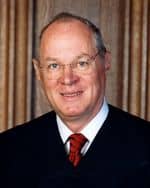THIS ANALYSIS IS CONTINUED FROM PART 1.
Before we get to Solicitor General Donald Verrilli, who argued after Ms. Bonauto on the first question — does the Fourteenth Amendment require all states to let gays marry — one additional word about Part 1.
 Justice Kennedy made the most telling point: the time lapse between Obergefell and Lawrence, the 2003 case that declared unconstitutional state laws that criminalized sodomy, is roughly the same time lapse between Brown v. Board of Education, which stated that segregation is unconstitutional, and Loving v. Virginia, the aptly named case that ended bans on interracial marriage. Justice Kennedy was nodding toward a gradual approach to civil rights: when the Court decided Brown, the country wasn't also ready for an end to all racial discrimination practices, particularly in marriage, and when the Court decided Lawrence, the country may have been ready to let gays love each other in the privacy of their own homes, but they weren't ready for gays marrying. Now, the theory goes, they might be.
Justice Kennedy made the most telling point: the time lapse between Obergefell and Lawrence, the 2003 case that declared unconstitutional state laws that criminalized sodomy, is roughly the same time lapse between Brown v. Board of Education, which stated that segregation is unconstitutional, and Loving v. Virginia, the aptly named case that ended bans on interracial marriage. Justice Kennedy was nodding toward a gradual approach to civil rights: when the Court decided Brown, the country wasn't also ready for an end to all racial discrimination practices, particularly in marriage, and when the Court decided Lawrence, the country may have been ready to let gays love each other in the privacy of their own homes, but they weren't ready for gays marrying. Now, the theory goes, they might be.
Follow along on the AUDIO files at 27:00 on the 'Question 1' Soundcloud segment HERE.
 Donald Verrilli, the Federal Government's lead lawyer at the Court, gave a strong argument in favor of marriage equality, stating, in the end, that it is "untenable" to take a wait-and-see approach and just let the question of equality play out in the states. First, the way it would play out is the creation of two different subcountries: one with marriage equality and one without. Second, the discrimination is evident and ongoing, with the Court allowing marriages to go forward in countless jurisdictions across the country. Permitting the status quo for some undefinable time is harmful.
Donald Verrilli, the Federal Government's lead lawyer at the Court, gave a strong argument in favor of marriage equality, stating, in the end, that it is "untenable" to take a wait-and-see approach and just let the question of equality play out in the states. First, the way it would play out is the creation of two different subcountries: one with marriage equality and one without. Second, the discrimination is evident and ongoing, with the Court allowing marriages to go forward in countless jurisdictions across the country. Permitting the status quo for some undefinable time is harmful.
A couple of initial conclusions from only this first part of the oral argument:
-
The oral arguments are not about persuading the justices. They most likely have their minds made up. But the justices are making points through questions, reminding oralists what concerns them and reminding their colleagues that these are the issues. There is also a lot of politics going on here. The Supreme Court is, for better or for worse, a political body in that it has to understand what's happening outside. Scalia asks questions, sometimes, for that reason; the Chief Justice stays silent, sometimes, for that reason. Justice Breyer strikes a middle ground tone, sometimes, for that reason. Do not read too much into those questions.
-
Donald Verrilli started his argument by saying that the case is about the "dignity" of gay persons and the "dignity" of their children. This is a direct message to Justice Kennedy, who wrote his Windsor opinion focused on the dignity of gay persons.
-
The conservative justices are most concerned with the question of "who decides?" More on that in the next column, but it strikes me as political posturing and quite expected. Conservatives have long argued that judges are too "activist" — they have thought so since the progressive courts of the 1960s. (Notably, they didn't think so before, when conservative courts were pretty aggressive, but that's another story.) All questions from Justices Alito and Scalia should be seen in that light: whatever they bring up is tinted by their distaste for having groups use the Federal Constitution to solve all the problems of modern discrimination. Alas, that's what it's there for (among other things).
-
Justice Alito asked a few questions about how Plato said wonderful things about gays, but Greece still didn't officially allow gays to marry. Accuracy of what happened in Greece aside, Justice Alito appears to be trying to say that you can be opposed to gay marriage and not be a total bigot (See Plato).
That argument is miles off topic. It is absolutely irrelevant what Plato did or did not do. Greece didn't have a Fourteenth Amendment and Plato lived in a time that condoned (and embraced) slavery. Let's not get off topic. And to his credit, Mr. Verrilli brought the conservative justices back on topic when he stated, at the end of his talk, that it was simply "untenable" to deny rights to same-sex couples under a gradualism approach. The country is ready. It is time.
It also time for the States' arguments. That's up next.
***
Follow me on Twitter.
Ari Ezra Waldman is Associate Professor of Law and the Director of the Institute for Information Law and Policy at New York Law School. He holds a Ph.D. from Columbia University, a J.D. from Harvard Law School, and a B.A. from Harvard College. Ari writes regular posts on law and various LGBT issues.



